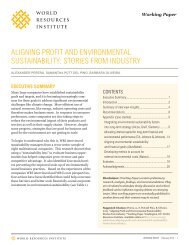Unleashing the Power of the Circular Economy
Unleashing the Power of the Circular Economy
Unleashing the Power of the Circular Economy
Create successful ePaper yourself
Turn your PDF publications into a flip-book with our unique Google optimized e-Paper software.
Obstacle 13 Lack<br />
<strong>of</strong> an information<br />
exchange system<br />
Obstacle 14<br />
Confidentiality<br />
and trust issues<br />
hamper exchange<br />
<strong>of</strong> information<br />
Obstacle 15<br />
Exchange <strong>of</strong><br />
materials is<br />
limited by capacity<br />
<strong>of</strong> reverse logistics<br />
I.IV<br />
Obstacle 16<br />
Lack <strong>of</strong> awareness<br />
and sense <strong>of</strong><br />
urgency, also in<br />
businesses<br />
The lack <strong>of</strong> an information and material exchange system is blocking <strong>the</strong><br />
exchange <strong>of</strong> materials between actors. As Interface points out: how do you<br />
know where “left over” is (carpet) and how to collect and distribute this? [50]<br />
Confidentiality and trust issues hamper exchange <strong>of</strong> information. This<br />
barrier is closely related to <strong>the</strong> lack <strong>of</strong> an information exchange system and<br />
to competition legislation inhibiting collaboration between companies.<br />
In addition, growing from a local to a wider scale requires trust and most<br />
<strong>of</strong>ten reduces <strong>the</strong> quality <strong>of</strong> <strong>the</strong> information. Cross-cycle and cross-sector<br />
information exchange is very complex. Confidentiality issues regarding access<br />
to information form one <strong>of</strong> <strong>the</strong> most important topics and certainly require<br />
fur<strong>the</strong>r discussion. [24] Since trust is a condition for value co-creation [144] , lack<br />
<strong>of</strong> trust <strong>of</strong>ten forms a barrier for co-creation and open innovation. Finally,<br />
<strong>the</strong> possibility that <strong>the</strong> outside world may deduct information concerning<br />
a company’s pr<strong>of</strong>it margins from increased transparency concerning e.g.<br />
business processes, added value and environmental costs, may deter<br />
companies from sharing this information.<br />
Reverse infrastructure is underdeveloped compared to forward infrastructure:<br />
<strong>the</strong> capacity is lower and <strong>the</strong>re are fewer channels available. Cost-efficient,<br />
user-friendly and high-quality reverse collection systems with guarantees,<br />
toge<strong>the</strong>r with infrastructure that maintains <strong>the</strong> quality <strong>of</strong> <strong>the</strong> products, are<br />
missing. [8, 24] However, today, value chains are geared for linear economy.<br />
Adding reverse logistics makes existing value chains even more complex. [108]<br />
Fur<strong>the</strong>rmore, health and safety issues may appear in reverse logistics and limit<br />
recycling. [71]<br />
Societal and value-related obstacles<br />
Public awareness <strong>of</strong> <strong>the</strong> importance <strong>of</strong> <strong>the</strong> circular economy is limited.<br />
Material consumption is highly embedded in our society. Product ownership<br />
has become part <strong>of</strong> peoples’ self-esteem. [73] Non-financial aspects <strong>of</strong> our<br />
economy are less valued by our society. [36] This is severely hampering <strong>the</strong><br />
transition, because it prevents <strong>the</strong> circular economy from being a political<br />
priority. As a result, mainstreaming top-down governmental measures like a<br />
tax shift are currently impossible. In addition, while more and more companies<br />
show circular economy leadership, many business leaders are ei<strong>the</strong>r not yet<br />
aware <strong>of</strong> <strong>the</strong> urgency <strong>of</strong> <strong>the</strong> transition towards a circular economy or refuse<br />
to believe <strong>the</strong> scientific evidence (see Chapter 2). This limits <strong>the</strong> speed <strong>of</strong> <strong>the</strong><br />
transition from <strong>the</strong> bottom up.<br />
43



